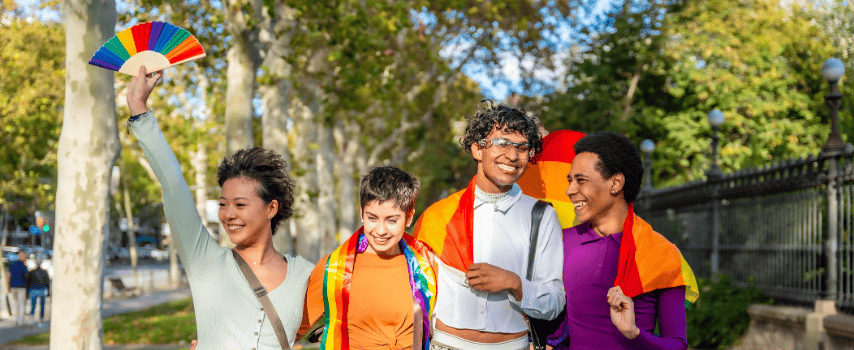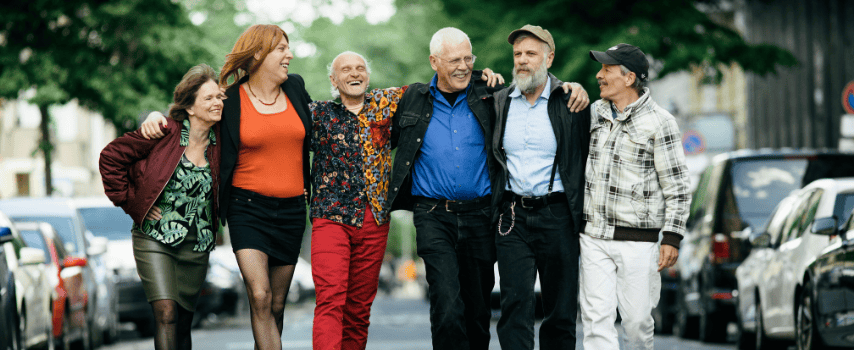Love more, worry less – explore our LGBTQIA+ travel safety tips
Want to discover the world and feel safer while you’re away from home? Dive into our LGBTQIA+ travel guide before you hit the skies. Because everyone deserves to travel – and travel safely.

Source: Getty Images
Heading overseas as an LGBTQIA+ traveller? Or maybe you’ve booked a getaway with someone who is? We’re so glad you’re here.
If travel is your thing, you know there’s nothing like the buzz of packing your bags and jetting off to see the world. But, before you hop on a plane, train or tuk-tuk, there’s something worth remembering: LGBTQIA+ travellers can have different experiences depending on where they go – even from one city to the next.
‘Sadly, travellers who are part of the LGBTQIA+ community can face extra challenges compared to travellers who aren’t,’ says Rodger Cook, Cover-More’s General Manager of Global Security Services.
‘Places with more traditional or conservative cultures, like parts of the Middle East, Asia and Africa, don’t always openly embrace LGBTQIA+ people in the same way that many Western countries do.’
Don’t let that stop you from travelling, though. Start by reading this international LGBTQIA+ travel safety guide. Hopefully, it’ll help you roam more confidently, worry less, and stay safer – all while ticking off your travel bucket list.
Skip ahead to read:
How to pick a destination that’s a thumbs up for LGBTQIA+ travel safety
About to lock in a trip to your dream destination? Hold up – before you book, get across the answers to these questions.
1. Is being LGBTQIA+ illegal in this country? If yes, is the law enforced?
Good news: the world’s becoming more open and inclusive every day – as it should! But, we've still got a way to go.
Right now, being LGBTQIA+ is still illegal (and the law is often enforced) in about 65 countries. Punishments can range from small fines to life in prison – or worse. It’s heavy stuff, but it’s good to know the lay of the land.
You’ve probably heard that laws in some countries exist but are rarely enforced. Still, it’s risky to openly break them (and we’d never suggest doing just that).
On the flip side, there are some countries that haven’t explicitly outlawed being LGBTQIA+, yet travel safety isn’t great if you identify as queer. Take Egypt, for example, where a vague law on ‘debauchery’ is used to target LGBTQIA+ people. If charged, travellers can face up to six years in prison. They may end up in dangerous situations at that point, because they’re placed with the general population (who may be anti-LGBTQIA+), and their sexuality could be made known to prison gang leaders. This might be alarming to think about, but it’s worth keeping in mind.
Another important thing to remember: the rights you enjoy at home don’t automatically apply abroad. If you break the law and face the consequences, the Australian Government can offer support – but it can’t pull a jailbreak or have your charges dropped.
‘No one’s above a country’s laws. You should always be cautious when travelling, and make sure you aren’t putting yourself at risk,’ says Cook. ‘Even if you don't agree with the laws and rules of a non-LGBTQIA+-friendly travel destination, you may need to change your behaviour for your own safety and security.’
So, before you book those flights, research the country’s LGBTQIA+ laws. Then, decide if you’re comfortable following them. If you aren’t, it’s OK to pivot your travel plans – there are loads of other LGBTQIA+ friendly travel destinations out there that will welcome you with open arms!
2. Even if being LGBTQIA+ is legal, is there a lot of discrimination?
Fun fact: a 2024 survey of LGBTQ+ travellers across 27 countries has found that 73% travellers have noticed rising inclusivity on their travels. This is great news for members of the LGBTQIA+ community who love travelling the world.
That said, even in LGBTQIA+-friendly travel destinations, not all experiences are great ones..ones. The same survey found that 59 per cent of LGBTQIA+ travellers have experienced discrimination while travelling.
Discrimination can vary from country to country and also from city to city. For instance, countries that recognise gay marriage and support gender transition rights are generally more inclusive. But some regions within those countries might still be (surprisingly!) less welcoming than others.
‘This can even happen in places like the United States, which is typically known as a gay-friendly travel destination. The reality is, several American states still have unconstitutional laws banning ‘same-sex conduct’. This puts queer travellers at risk of discrimination – or worse,’ says Cook.
Wondering what to make of all this? Here’s our two cents: look for cities or regions that celebrate equality and inclusion. And then, get across local customs and attitudes. This’ll help you figure out if the destination is right for you.
3. Does the destination host LGBTQIA+ events like Pride?
There’s nothing like the magic of being at Pride. It’s an amazing way to fully celebrate who you are and meet others who share your vibe – especially in cities with iconic Pride celebrations like Berlin, Tel Aviv, or São Paolo.
So, if you’re not sure whether a place is a safe LGBTQIA+ travel destination, check if they have Pride festivities happening. If the answer’s yes, it’ll likely be safer to go there during Pride.
Want a tip for finding your community overseas outside of Pride season? Social media is your BFF for finding queer events. Look out for local LGBTQIA+ meetups, parties, or cultural events. Still unsure? Reach out to local LGBTQIA+ organisations for tips.
That said, it’s best to steer clear of LGBTQIA+ events tied to protests. Rights to protest, like those in Australia, don’t always exist in other places. Joining a protest overseas could put you in harm’s way, especially in places less accepting of LGBTQIA+ communities.
‘It’s vital for LGBTQIA+ travellers to understand the jurisdictions and customs of any country they visit. The same goes for avoiding situations that may lead to trouble,’ said Cook.
‘If you attend an emerging LGBTQIA+ community protest – or add your voice of support to a protest via social media – you may make yourself vulnerable to harm. It’s best to steer clear.’

Source: Getty Images
5 LGBTQIA+ travel safety tips for unfriendly destinations
Have you picked your next holiday spot, then discovered learned the country doesn’t fly the rainbow flag?
Consider not ditching the dream just yet! You may still be able to explore those bucket-list destinations and stay true to yourself. Here are five travel tips to help you stay safe and explore with more confidence.
1. Stick to cities
Big cities = big vibes. Urban areas and tourist hotspots tend to be more diverse and inclusive than rural pockets.
Take Budapest, for instance. Hungary might be on the conservative side, but the city’s queer scene is vibrant and alive!
If in doubt, head where the city lights (and disco balls!) shine brighter.
2. Travel in a group
Travelling solo? Sure, it’s adventurous. But sometimes, there’s more safety (and more laughs!) in numbers.
You could book your trip through a LGBTQIA+-friendly travel agent or tour organiser. They’ll match you with like-minded travellers and knowledgeable guides who’ve got your back.
‘Travelling with knowledgeable LGBTQIA+ travel guides means advice and support are right at your fingertips. This can help you feel and stay safer while abroad,’ says Cook.
3. Be careful with PDA
We know love is love, and it’s always worth celebrating. But unfortunately, not every country or culture is cool with hand-holding, kissing, or other public displays of affection.
Laws or local attitudes in some places might frown on it (or even completely outlaw it!) for anyone, LGBTQIA+ or otherwise.
So, keep those acts of love for when you’re in private to avoid unwanted attention.
4. Do your homework on local customs
Each country comes with its own set of cultural rules when it comes to clothing, behaviour, religious norms and gender expression. A quick Google or ChatGPT sesh on this can go a long way.
‘As a tourist, you might be given a little leeway, but being respectful of local customs is always the wiser move,’ reminds Cook.
So, stay curious yet cautious for your best chance at a smoother trip.
5. Scrub your digital life
Tech lovers, listen up! Some countries have strict laws around websites, apps, and online activity, and severe consequences for travellers who (even unknowingly) break the laws.
Before you jet off, consider setting your social media profiles to private, making your profile picture neutral, removing your relationship status, and removing LGBTQIA+ dating apps from your phone. Oh, and any sensitive messages or photos? Probably best to leave those at home.
Want to go extra secure? Take a different phone with you.
‘It’s a great way to avoid any unwelcome surprises during your travels, avoid any issues related to how you use your phone at home,’ Cook adds.

Source: Getty Images
8 LGBTQIA+ travel safety tips for every trip
Plotting your next trip? Amazing!
No matter where you’re travelling, these eight simple safety tips may help make sure your trip is smoother, safer, and unforgettable (in a good way!).
1. Get travel alerts and share your plans
It’s smart to look into travel alerts before you set off!
Did you know our Cover-More app can send our travellers alerts if there’s something risky going on nearby? Download our app via the App Store or Google Play and check it out for yourself!
The Australian Government’s Smartraveller website is another great resource. You can sign up for its travel advice and news updates to stay on top of the important stuff.
Oh, and don’t forget to share your travel plans, including where you’ll be staying, with family or friends back home.
2. Master a bit of the local lingo
It’s time to keep going with that Duolingo streak! Learning even a sprinkle of the local language can go a looong way.
Whether it’s asking for directions, getting help, or just blending in, knowing a few phrases can be a lifesaver.
3. Know your rights
If you find yourself dealing with airport security or being questioned by police, understanding your legal rights can come in handy. Speak up (kindly) when needed, and you’ll feel more confident about any situation.
4. Bring a doctor’s note
If there’s a mismatch between the gender marker on your passport and your gender presentation, a doctor’s note can help smooth things over during border checks. Better safe than caught in a confusing situation!
5. Keep your meds in their original packaging
Packing meds? Keep them in their original packaging. This might help you avoid awkward moments at customs or airport checkpoints. A little extra effort now can save time and stress later.
6. Research healthcare access for tourists
Play it safe by finding out how healthcare works for tourists at your destination.
Can you get emergency care? Will your prescriptions be refillable if you’re there a while? Do the homework now so you’ll know what to expect if things take an unexpected turn while you’re travelling.
7. Book LGBTQIA+-friendly hotels
Check those reservations (and have a peek at reviews)! Sadly, not every hotel is as welcoming as you’d hope. Booking in advance gives you time to confirm their policies for same-sex couples, saving you any unpleasant moments at the check-in desk.
8. Don’t skip travel insurance
Life’s full of surprises, and trips are no exception! That’s why it’s smart to pack travel insurance – it can have your back if things go pear-shaped unexpectedly. From unexpected medical situations to dealing with delayed baggage, having cover means you can focus more on fun and less on the ‘what ifs.’
Time to pack those bags
At Cover-More, we’re all about helping LGBTQIA+ travellers roam the world safely with more confidence and less fears.
Follow these tips, safeguard your trip with travel insurance, and get ready to explore more and worry less. The world’s waiting!
Love more, worry less – it’s time to get cracking on your cover
Apply SPF50+ on your trip before you take off.
Sources:
The information and advice contained on this page is general advice only and is correct at the time of writing (10 June 2025) and may change at any time.